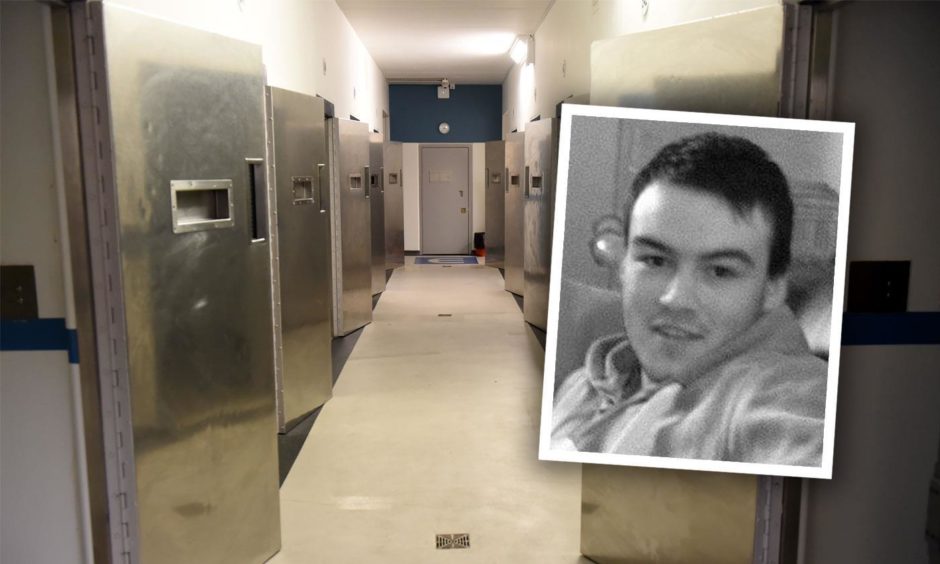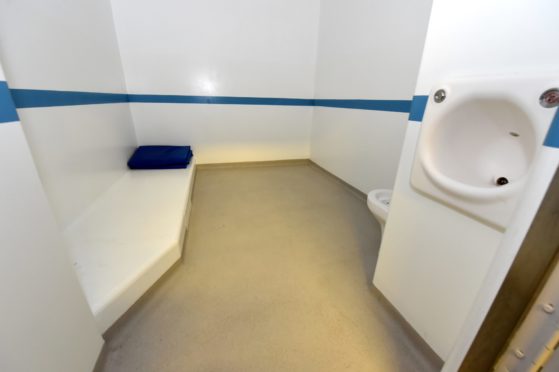“Institutional failures” caused Police Scotland to miss opportunities that could have prevented a young Aberdeen man’s death in custody, a fatal accident inquiry has finally concluded.
Warren Fenty, 20, suffered a fatal methadone intoxication while locked up in a jail cell inside Kittybrewster custody suite at 7.25am on June 29 2014.
He’d earlier been arrested at Aberdeen Royal Infirmary after discharging himself from hospital against the advice of a doctor who had treated his overdose.
The fatal accident inquiry into his death – the longest-running in Scottish legal history – identified that his death was “likely” avoidable in a 39-page report published today.
Although in his determination Sheriff Principal Derek Pyle found that “no one individual can be held responsible” for the tragedy, he singled out a series of shortcomings by Police Scotland and the care Mr Fenty received while in custody.
They included a lack of patient information-sharing between those in contact with Mr Fenty, an inadequate examination by the newly opened custody suite’s in-house medic and welfare checks on the increasingly ailing detainee that failed to follow standard operating procedure.
“In my opinion, there were a number of institutional failures by Police Scotland, which while not material as a contributory cause of Mr Fenty’s death were nevertheless precautions which if they had been taken would have presented opportunities for Mr Fenty to be returned to hospital,” the sheriff principal said.
He concluded that such intervention “would have probably resulted in clinicians realising at some uncertain point in the hours before his death that Mr Fenty’s life was at risk and would have been able to prevent it”.
Missed opportunities to save Warren Fenty’s life
At the time, Police Scotland did not have but “should have had” a procedure for the handover of patients from hospital into the custody of police officers.
That would have provided officers with “information on the nature of the medical condition, the treatment and any further precautions which should be taken post discharge,” the determination stated.
Sheriff Principal Pyle also said that Police Scotland’s on-duty forensic medical examiner at the time, the now-retired Dr Alasdair Weston, “should have carried out a more thorough medical examination” when Mr Fenty first arrived at the facility, which had been open only a few days before.
Not doing so “created a missed opportunity which if taken might have resulted in his re-admission into hospital and which would be likely to have avoided his death,” the sheriff principal added.
He went on to criticise custody officers for failing to follow the strict rules for conducting cell checks, “which created a missed opportunity which might have resulted in them seeking the advice of the forensic medical examiner, which might, in turn, have resulted in Mr Fenty’s re-admission into hospital, which might have avoided his death”.
Chaotic scenes in ‘short-staffed’ custody suite
Sheriff Principal Pyle branded working conditions at the new custody suite as “chaotic”, with just two officers “running around like headless chickens” as they looked after 42 prisoners.
He added that “no one seems to have considered the quality of the staff, rather than just their quantity”.
One was just a relief officer and the other had only been in the post for “a month or so”.
The sheriff principal commented: “It was always likely that such officers … would struggle to cope.”
As well as the number of custodies, staff at Kittybrewster had a number of other problems to contend with, the report said.
The fire alarm was faulty and going off, CCTV cameras were malfunctioning and the fingerprint machine was also not working – meaning one officer who would normally perform cell checks on detainees spent his whole shift dealing with the fingerprint machine.
Mr Fenty was on suicide watch, requiring half-hourly checks in which police personnel were expected to rouse and speak with him on every visit.
They were not supposed to leave until they secured a distinct verbal response (DVR) from Mr Fenty.
However, the inquiry was told, that neither of the two officers knew of his recent methadone overdose or that he’d been in hospital and later vomited at the police station.
Between 10.43pm and 6.40am Pc Derek Dawson and Pcso Alison Murison carried out a total of 14 checks on Mr Fenty in his cell, but only received a distinct verbal response on three of those occasions.
A colleague, Pcso Campbell, eventually discovered Mr Fenty unresponsive at 7am but by then it was too late to help him.
Sheriff Principal Pyle said: “In my opinion, it can be concluded that if Kittybrewster had been run properly and DVR compliant checks had been performed, it is possible that medical assistance would have been sought for Mr Fenty, that he would have been returned to hospital and that he would have survived.”
Years of delays brought torment to Warren Fenty’s mother
Publication of the determination marks an end to the longest-running FAI in Scottish legal history, which was plagued by a string of delays.
Even before the case reached court proceedings, the Crown Office and Procurator Fiscal Service (COPFS) took around five years to investigate Mr Fenty’s death.
But only just under two of those years were “usefully spent”, Sheriff Principal Pyle said as he slammed Crown officials for a three-year gap of total inactivity that he added “cannot be excused”.
However, the sheriff principal was himself later responsible for missing the last of five failed publication deadlines for which he’d already removed the original presiding sheriff after Morag McLaughlin’s “failure” to deliver her conclusions for “personal medical reasons”.
The determination began with the statement: “The investigation of Mr Fenty’s death has taken far too long.”
It later noted that the decade of delay had “added a considerable burden to the grief” suffered by Mr Fenty’s 54-year-old mum Sharon.
“Whether having heard all of the evidence and having read this determination Mrs Fenty is able fully to understand what happened I cannot say,” Sheriff Principal Pyle said, adding: “But I hope that what follows at least gives her some insight.”
His determination also made mention that NHS Grampian and Police Scotland “rightly accepted that changes in systems and processes were required as a result of Mr Fenty’s death (and which they have introduced)”.
The report, which summarised the evidence of 19 witnesses heard by Aberdeen Sheriff Court over 12 days, included details of changes to resources at Kittybrewster custody suite where staff numbers have “nearly doubled” and “there is now a nurse on-site at all times”.
READ MORE:
The many twists, turns and tears in Scotland’s longest-ever police custody death inquiry
Aberdeen mum claims son’s police custody death inquiry fails to deliver closure or justice
Comment – Justice system guilty of making Warren Fenty’s mother suffer for a decade
For all the latest court cases in Aberdeen as well as crime and breaking incidents, join our Facebook group.




